With anxiety and depression levels rising in kids, mindfulness and meditation are increasingly being employed by parents. Here are 7 of the best mindfulness books for kids on the market that can instill these two essential life skills, keeping children calm and centered. By Ann Vrlak.
Would you like to introduce mindfulness to your child, but aren’t sure where to start?
It has been wonderful to see the explosion of interest in mindfulness for kids – in schools and in homes all around the world. There is a growing body of research that shows how simple mindfulness practices – tailored for children – can help kids learn invaluable skills they can use their whole lives, like how to:
- Self-regulate emotions
- Improve self-esteem and confidence
- Relax when you’re stressed or worried
- Concentrate better
- Treat yourself with kindness and compassion
- Increase empathy
With this impressive list, it’s no surprise that schools are incorporating some form of mindfulness exercises in elementary and high school classes. Furthermore, many parents want to know how to teach mindfulness themselves, to help their children navigate everyday stresses and conflicts, and to learn tools to relax or take a pause if they feel upset.
There are so many books about mindfulness for kids to choose from. I’ve done the work for you by choosing my seven absolute favorites. They’re all also five-star rated by the parents and kids I’ve recommended them to.
Storybooks
Storybooks are one great style of mindfulness book that explain concepts to children. Here are three of the best that are currently on the market:
1. Moody Cow Meditates | Kerry Lee MacLean
Peter the calf has a “stupid, rotten day when everything went wrong.” He woke up with a bad dream, his sister drew on his skateboard, and the day just goes downhill from there. He is so upset and angry his sister names him “Moody Cow” which just makes things worse!
Moody Cow Meditates is one of the best mindfulness books for kids because it describes the kind of day we all can have when nothing goes right and no one seems to be on your side! Peter visits his wise grandfather who shows him how to create a mindfulness jar: he adds sparkles to a jar of clear water for each angry thought he has and then shakes the jar.
RELATED: The benefits of meditation for kids
His grandfather explains how the agitated, cloudy water is like his agitated mind, full of thoughts. And as the water settles down, and the sparkles settle, it’s just like when you calm down again and can see things more clearly. Grandfather gently takes Peter through the mindfulness jar practice from his upset mind to a quiet place.
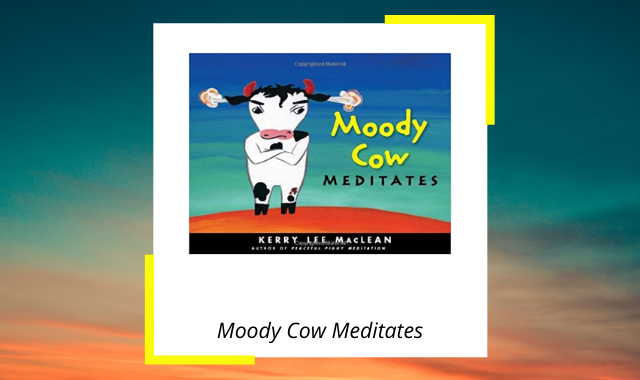
2. Visiting Feelings | Lauren Rubenstein
Visiting Feelings is a book that also looks at how to be with emotions in a healthy way. Rubenstein encourages kids, through gorgeous illustrations, to treat their feelings like unexpected visitors. How tall is this feeling? What colour and shape is it? Is it warm or cold?
By asking these kinds of questions, the author is encouraging kids to observe feelings at arm’s length, to be curious about them, instead of thinking that something is wrong. Make friends with feelings, she says, and listen to what they have to tell you.
“There is a growing body of research that shows how simple mindfulness practices – tailored for children – can help kids learn invaluable skills they can use their whole lives.”
Rubenstein also gently asks kids to notice where feelings live in their body – another traditional adult practice of noticing the physical qualities of an emotion – like a knot in your stomach, that give you a concrete place to begin exploring the emotion.
There is a “Note to Parents” in the back of the book about emotional intelligence and tips on how to help children link mindfulness to emotions.
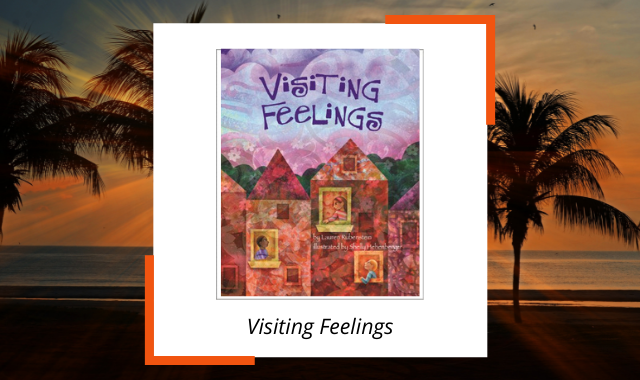
3. Take the time: Mindfulness for Kids | Maud Roegiers
This lovely mindfulness book for children has a powerful message: if you’re feeling bad, do something small to feel better. Be with your friends, feel the cold air on your cheeks, or do something you love.
And, whether we’re five years old or 50, when we’re feeling sad or upset, we often feel like we have to fix something or do something complicated to feel better. Focusing instead on small, simple pleasures that are always around us if we take time to look, is a tool of health and well-being your child can nurture throughout their life.
The beautiful, heartwarming illustrations in Take the Time... bring the story to life.
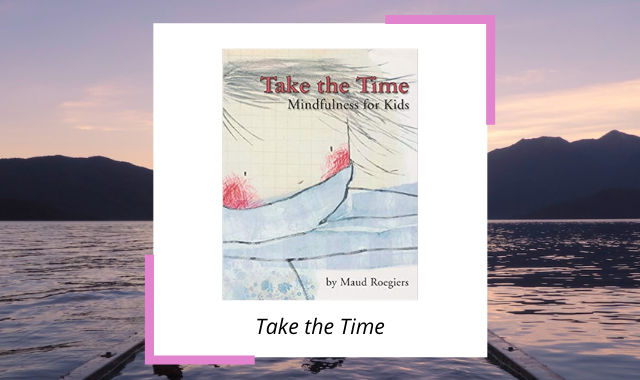
4. Zen Shorts | Jon J. Muth
This is one of Muth’s delightful mindfulness for children books that features the wise panda, Stillwater. Zen Shorts begins with a large, panda suddenly appearing in Michael, Karl and Addy’s back yard. He’s a mysterious fellow and a storyteller who soon has the children entranced with classic meditation stories put into kids’ language: someone who shows compassion for a robber and the man who says, “Maybe” to a whole series of life events that everyone assumes are “good” or “bad.” Kids also love Zen Happiness, Zen Socks and other books by Muth.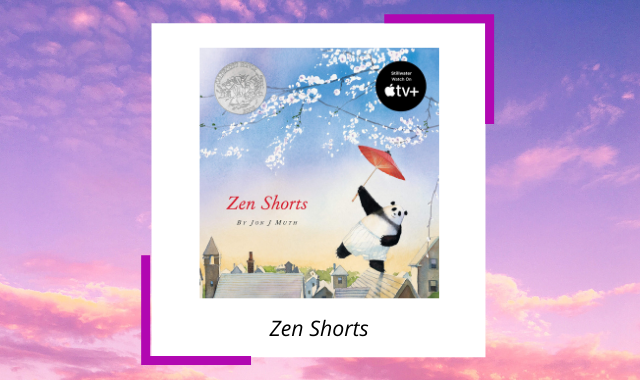
Books with mindfulness exercises for kids
Each of the following great books has sections explaining the principles and benefits of mindfulness for children, teaching tips and lots of specific mindfulness exercises you can do with your children.
5. Planting Seeds: Practicing Mindfulness with Children | Thich Nhat Hanh and the Plum Village Community
This book by beloved Buddhist teacher Thich Nhat Hanh shines with love and respect for children, and how to nurture their growth through simple meditation practices.
Hanh talks about meditation as a way to plant the seeds of self-awareness, relaxing through breath, recognizing your connection to nature, nurture compassion and community, embrace emotions – and more. All the ideas are accompanied by simple, engaging exercises kids can do on their own or with a guide – and many are included on an accompanying CD.
RELATED: Thich Nhat Hanh – his life in quotes and teachings
My personal favourite to do with kids is the Pebble Meditation. Kids gather four pebbles to represent a flower, mountain, still water and space, and use them in a meditation to emulate each of their qualities: “Fresh like a flower... Solid like a mountain.” This meditation, and others, builds on kids’ imagination and ability to embody positive and resilient states.
Every chapter in Planting Seeds is grounded in caring for children, and encouragement to explore their inner and outer world with kindness for their own sake and the sake of all beings.
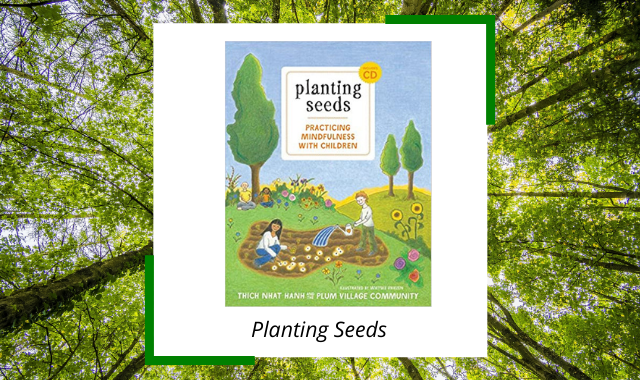
6. Child’s Mind: Mindfulness Practices to Help Our Children be More Focused, Calm and Relaxed | Christopher Willard
This is an excellent mindfulness book for kids if you would like to know more about the psychological applications of meditation for children – for everyday challenges and for kids who are troubled by chronic anxiety or depression. Willard is a clinical psychologist and psychotherapist with a deep experience with mindfulness and meditation. He talks about meditation’s effect on kids’ mental, emotional and physical well-being in easy to understand language, and how parents can use mindfulness to help their children overcome difficulties.
“ If you’d like to explore the world of mindfulness books for kids, all of these titles will give you and your child an experienced, caring and fun place to start.”
Child's Mind features a creative range of mindfulness practices like The Universe in a Raisin; Hugging Meditation; Everyday Mindfulness, Everyday Games; and, Homesickness Meditation. All encourage kids to mindfully and gently explore what’s happening for them. I use many of his exercises with my young mindfulness students for the balanced way he shows kids how to accept and honour their own feelings, and how to do mindful things to feel better.
RELATED: The benefits of meditation for kids
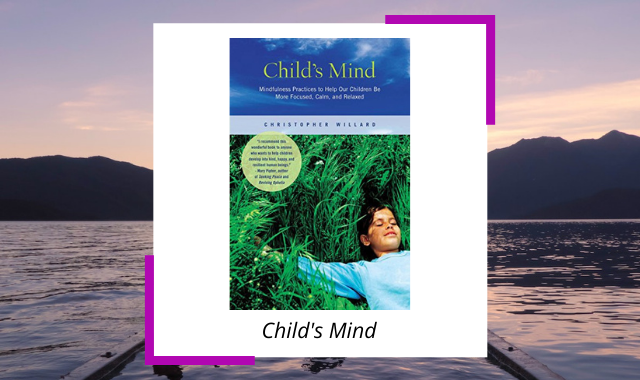
7. Sitting Still Like a Frog: Mindfulness Exercises for Kids (and Their Parents) | Eline Snel
If you’d like a short, approachable book about why mindfulness is a great skill for kids, read Sitting Still Like a Frog. Each chapter in the book explains a mindfulness concept or skill, and includes one or two exercises for kids to practice with. Some of the concepts Snel explains are Training your Attention Muscle, Weathering the Storm Inside and The Conveyor Belt of Worries. She uses imagery to great effect to help kids relate to their feelings, thoughts and experiences in entertaining, mindful ways.
RELATED: 6 secrets to raising happy children
Snel also includes short exercises parents can use with everyday routines, like meals and bedtime. She makes all the concepts fun and has a warm way of communicating. This book also includes a CD with many of the best guided practices. There is also an accompanying activity book with 75 mindfulness games.
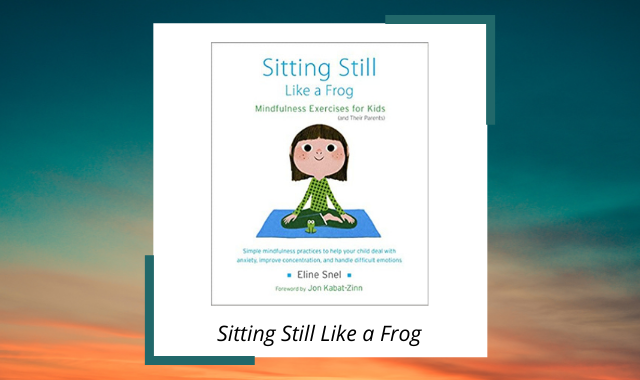
The takeaway: best mindfulness books for kids
So, if you’d like to explore the world of mindfulness books for kids, all of these titles will give you and your child an experienced, caring and fun place to start. The books don’t just talk about mindfulness, they embody mindfulness in the way they talk about children and their needs, and the way they talk to kids in the stories and exercises.
Most of these authors have more than one book, so you and your family can enjoy them together for a long time to come. •
Main image: shutterstock/Tatiana Bobkova
happiness.com | The fine art of being: learn, practise, share
Are you a happiness.com member? Sign up for free now to:
■ enjoy our happiness magazine with practical life tips
■ share and support in our happiness forum
■ learn with free online classes in our happiness Academy
Written by Ann Vrlak
 Ann Vrlak is Founder of OneSelf Meditation and a meditation practitioner for over 25 years. She’s a Certified Meditation Teacher for adults and for children (the best job ever!). She loves to share how the perspective and practice of meditation can support people with their everyday stresses and on their journey of self-discovery.
Ann Vrlak is Founder of OneSelf Meditation and a meditation practitioner for over 25 years. She’s a Certified Meditation Teacher for adults and for children (the best job ever!). She loves to share how the perspective and practice of meditation can support people with their everyday stresses and on their journey of self-discovery.





Join the conversation
You are posting as a guest. If you have an account, sign in now to post with your account.
There are no comments to display.